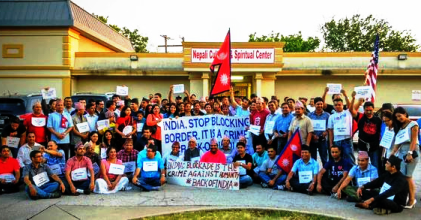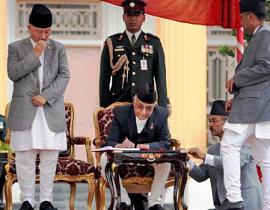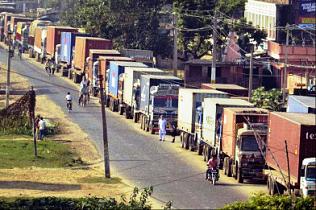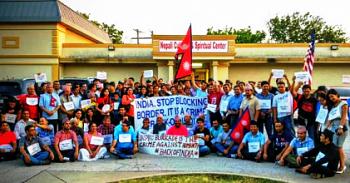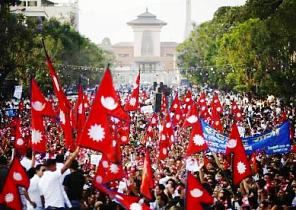Rising Nepal impacts on international political horizon
Nepal´s freshly formed republic with multiparty system headed by President Bhidhya Devi Bhandari has a Prime Minister Khadga Prasad Sharma Oli with executive powers to run affairs of the country. The republic´s legislative power vests with the Constituent Assembly. Nepal declared a secular state in 2006, after the end of a decade-long civil war between Maoist insurgents and the state claiming nearly 16,000 lives, elected a Constituent Assembly in 2008. This was followed by abolishment of 240 year old Hindu monarchy.
Nepal´s political upheaval, mayhem and disturbance have had tremendous effect on its economy and political stability. The outside interference contributed hugely to keep this small emerging democracy on tenterhooks. China in the north, as Nepalese believe, a trusted friend secured its border by constructing state of the art Silk Road connecting Kathmandu with China, a fillip to the China-Nepal relations adding a bonus by gifting 100 truckloads of arms and ammunition.
The other border in the south connecting Kathmandu with India through UP (Uttar Pradesh) and Bihar has at times been tense and fragile. India considering Nepal strictly a Hindu country, though having more than 50% Buddhist population with proclivity towards Maoist brand of Communism, believes it has a right to manage the affairs of the Himalayan sovereign country. All with ease, comfort and as a matter of right a police sub-inspector from UP crosses over to Kathmandu to apprehend a petty criminal, arrests him and carries him back to India without letting Nepalese government know what happened.
The blockade choking Nepal of essential supplies mainly gas, diesel and petrol turned the local mood against India, Reports Kallol Bhattacherjee from Kathmandu (October 15, 2015). Nepal a landlocked country like Bhutan depends on India for their imports using Calcutta port. The facility provided acts as a tool to keep the smaller nations around under thumb leaving no chance even to complain. The gas scarcity impacted the tourist flow severely and the worst hit transport workers spent their days on the streets of Kathmandu waiting for fuel. Agricultural workers, mountain dwellers and poultry sector are the main sufferers resulting in harsh criticism of the blockade reserved against present Indian Prime Minster Modi’s government.
Bihari K Shrestha, a noted journalist writes (October 09, 2015) that Nepal has once again become a victim of New Delhi´s attempt to flex its muscles and exploit the fringe elements of a disgruntled defeatist pro-India political party. What is even more perplexing is that India, which is aspiring to become a permanent member of the UN Security Council, has got itself embroiled in this misadventure out of which it has no perceived advantage or exit strategy. India´s foreign policy has become the subject of ridicule around the world, even from pundits within India. Nepal´s bonded relations with China do not make it landlocked and there is nothing stopping us from improving our road and air links to China, Shrestha added.
A group of 22 Nepali political parties protested to prevent Indian Prime Minister Modi from speaking at a temple branding it as Hindu propaganda. Nepal´s various popular political parties fought for years to have a secular federal republic against those who interfered with new Republic´s Constitution. Pushpa Kamal Dahal Maoist leader and President stated that Modi´s visit to the temple, decked out for the occasion, where he was expected to speak to Nepali and Indian Hindus gave birth to many conspiracies against Nepal to subvert our just adopted 20th September, 2015 secular Republican Constitution. The battle won for a secular government is threatened and we must safeguard it to ensure that our country does not again have a state religion, Dahal elaborated.
Indian Prime Minister Modi congratulating his counterpart expressed hope that Prime Minister Oli would carry all sections of society along for peace and stability. The Indian moves against Nepal are criticized in Kathmandu, where the Indian flag and the effigies of Prime Minister Modi were burnt by protestors accusing India of interference. Indian Ambassador Ranjit Rae expressed concern about the growing anti-India sentiment in Nepal. "We are concerned about the activities of burning India´s national flags and Prime Minister Narendra Modi´s effigies".
A large scale development program in Nepal is on challenging India´s dominance; Chinese engineers work hard on upgrading eight-lane highway circling Nepalese capital at a cost of $ 45 million. The growing trade between two countries is based on the offers of cheap pricing of Chinese goods and as reported Chinese overall trade overtook India´s figure multiple times; China being the biggest foreign investor. Observers say that the rail connectivity with China will spur the globalization of the Nepalese economy. Once a rail connection with China is established, Nepalese goods can be transited to the international markets through the Eurasian transportation network.
China-Pakistan economic corridor, nearing completion; President Xi Jinping pledging $ 40 billion has already caused ripples in Indian political circles as it is thought to facilitate a direct Chinese land route to the Arabian Sea. China, as reported, has since completed a rail link near Nepal border which could make Nepal´s dependence on Calcutta port irrelevant. The data compiled by Bloomberg shows that a leap in Nepal´s trade with China after the end of Maoist insurgency spiraled considerably. The development program unsettles India and the eroding Indian influence in Nepal causes overwhelming anxiety for New Delhi´s leaders.
The Guardian reports that growing Chinese presence in Nepal goes beyond roads and railways, with massive hydroelectric projects, airports and a pilgrimage centre at Lumbini, the birthplace of Buddha, all slated to receive substantial funding from Beijing. But Indian strategists are most worried about Beijing´s links with India´s western neighbor. "We are much more concerned about the Chinese relationship with Pakistan than with Nepal " said retired senior diplomat G. Parthasarathy.
While China is expected to take bilateral ties to a new level; Nepal thanked China for its help, saying the country expects to gain more benefits from the communist nation´s help in developmental programs. It was further stated that Nepal welcomes and is ready to participate in various projects advocated by China; referring to the Silk Road and Maritime Silk Road projects.
In a new development Nepal Prime Minister Oli flayed India´s statement (November 06, 2015) criticizing India for raking up human rights abuses in the Himalayan nation at UN Human Rights Council meet in Geneva. India, for the first time, raised the issue of war crimes committed during the decade-long conflict in any international forum and urged Nepal to carry out the transitional justice mechanisms in an effective way. Speaking to the media, Mr. Oli demanded to know how India could be ignorant that the UN was involved in Nepal’s peace process.
Pro-India Madhes population concentrated along India-Nepal border creating a law and order situation is of great concern for Prime Minister Oli´s government. The recent blockade of supplies to Nepal, as believed, has direct connection with happenings alongside the long porous border. It is not surprising to see people of Nepalese origin joining in the huge numbers including Kashmiris, Sikhs, Dalits and Indian Christians demonstrating against now on Indian Prime Minister’s visit to Britain.
Comments
There are 0 comments on this post




